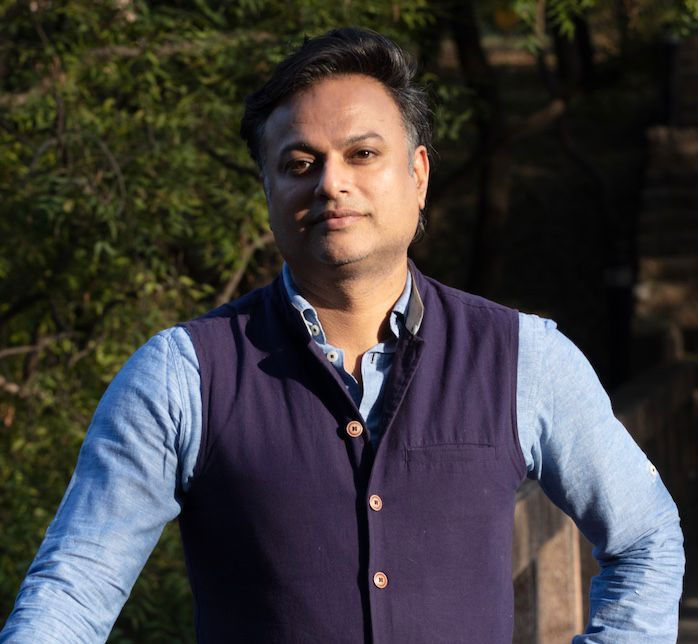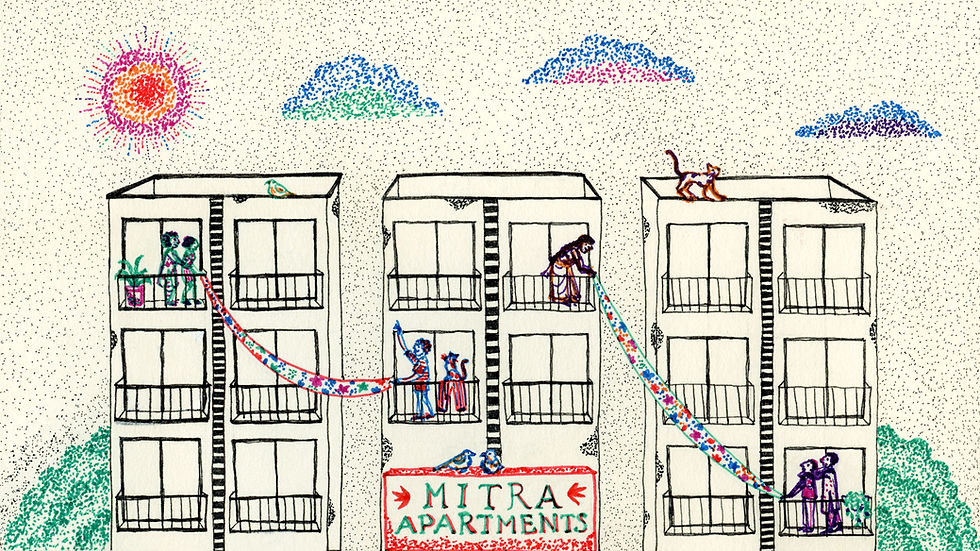Freedom’s Price: Queer Life in Indian Cities
- Jul 28, 2025
- 6 min read
Updated: Aug 29, 2025
Urban centres offer anonymity and community, yet migrants grapple with high costs, job precarity, discrimination, and isolation.

Chapal Mehra

Illustration by: Sharanya Kunnath
“It felt like freedom,” Dinesh whispers, remembering his move to the glittering, people-infested Mumbai as the salty sea breeze caresses his face. The 39-year-old doctor’s first room was damp, with a view of the sea, and roaches. The roaches left with his lovers, and the sea stayed.
“I don’t know if my family would have understood. Maybe they would have. Irrespective, I knew I needed to get away,” he tells me. Unable to come out to his family for years, he moved to Mumbai in his twenties to escape the questions in his small town in Karnataka. “When you are gay, you need a place where no one knows or cares what you do,” he says with a smile, adding that he remains unsure whether he is gay or bisexual.
Queer migrants like Dinesh are everywhere in India. Huddled in matchbox rooms in megacities seeking freedom, hope, desire, and a chance at love. Every week, many flee smaller cities and villages and their claustrophobic homes, where even walls can hear. They hope to live a queer life on their terms, with a breath of freedom, better opportunities, and sexual, social, and economic agency.
Mumbai, Delhi, Bangalore, Hyderabad, Chennai, and Pune have become sanctuaries for queer folks. Though not without challenges, they offer anonymity and a broader queer community. “Everything is so expensive and often unsafe. But this is a city where I can be a lesbian. I have friends,” says Anu. The 30-year-old, with hair dyed with streaks of blue, had studied hard, aced her exams, secured a scholarship, and a job in Delhi. “As a young lesbian in a small town in Uttar Pradesh, I was resigned to being lonely. Then I fell in love. Now going back is impossible,” she tells me, while exchanging a loving smile with her partner at their small apartment in one of Delhi’s many crowded urban clusters, where migrants of all shades collect.
Despite the comfort of smaller towns, the oppression and the near-vindictive attitudes towards people who identify as queer, the endless badgering over marriage, and living a “pretend” heteronormative life, force them to flee the confines of families and homes to find freedom and hopefully others like them. The easiest way out is to apply for outstation jobs and leave, which Ali did as soon as his family started receiving marriage proposals for him.
“You can’t be gay or lesbian in Agra. It’s oppressive. Anyone can find out. Everything is everybody’s business,” Ali tells me. The 31-year-old HR professional has been living in Delhi for four years and goes home only for short holidays. “For years, I lived with the guilt about being Muslim and gay. And then I found others like me on the internet. I knew I can’t get married,” he says.
The internet also fosters hope for a real queer life and inspires them to migrate. For Ali, social media posts of queer couples in Delhi and Mumbai also provided an impetus to move. “I knew I had to get out there. Maybe I could also live that life. Had I not come here, I would have been married by now,” he says.
Life in the big city
Migrating, though, is challenging—cities are expensive, rents gouge you, landlords hassle you, and roads are dangerous. Housing in particular can bring a constant barrage of judgment by landlords who, between forwarding religious miracles and yoga poses, share their perspectives on queerness. There is also the looming threat of eviction, which can happen if a person shows a hint of queerness or just has too many visitors, regardless of their gender. Finally, there is marriage. When asked why she is single, Anu says that her initial impulse is to retort, but she holds back her words. “We need this room,” she says wryly.
Shankar is the quintessential gay man in a big city. Despite financial independence and ripped muscles, the 29-year-old is desperately lonely and is into amphetamines. “I am not addicted. I need a release from the stress sometimes,” he says confidently. During our chat in a hip café in Bangalore’s Church Street, he routinely checks Grindr and taps it incessantly. His statements reveal two growing concerns among people who identify as queer in cities: loneliness and the use of substances. “I don’t know why I am single. It’s so hard to meet nice people. And then when you give up, someone messages you for sex and you give in,” he says, shrugging.
Employment, for queer folks, is never easy. One needs to have networks and know English to find a reliable job. Moreover, queer people already reside in exclusionary spaces, often hiding behind the façade of being straight, and only a handful of companies in India are queer-friendly. “Most places don’t have queer friendly hiring, and if you come out, anything is possible, a software engineer working in one of India’s leading construction firms, who wished to remain anonymous, tells me. He adds that tasteless jokes, harassment, and constantly being overlooked for promotions were par for the course. “You cannot really be ‘out’. Not in my profession. Even if the organisation does not discriminate, your senior can,” Dinesh tells me. His aspirations to settle abroad didn’t materialise, so he’s made Mumbai his home. “Sometimes you decide to settle for less because you don’t want to go back—in income, in space, in life,” Dinesh adds.
For many queer migrants, the city is the first place they can breathe. Rural and small-town India remains a minefield, where lesbian women can face “corrective” rape or honour killings, and gay men are disowned or driven to suicide. But it is worse if you are a trans person. The family often disowns or abandons you, and most trans folks are pushed out of their local communities. “In the end, sex work in big cities remains our only option. There, we can start our lives anew,” Lovely tells me. The 27-year-old transperson adjusts her polyester, sequined dupatta as she narrates how her feminine demeanour and insistence on dressing up as a girl led to abuse and confinement. One day, she escaped and took the first train out. No one came looking for her, and she never went back.
We meet at a community meeting in the office of a small NGO in Delhi. There is laughter, stories, and gossip. They smile at my naive questions, unable to grasp their complicated, visceral existence. For the transpersons, some of whom identify as hijra, employment options are virtually non-existent. “Smart hai hamari Lovely (Our Lovely is smart),” one of the older trans persons tells me. Lovely speaks English and has studied till Class 10 in an English-medium school, but is unable to get a job because she is so obviously trans. “So I have to do sex work to survive,” she says.
India’s “progressive” cities signify acceptance, but with it also comes exclusion, exploitation, and poor mental health. The veneer cracks quickly, even within the community, as caste and class barriers are visible. “How many people in leadership positions are from our community—hijras, Dalit, or poor? Tell me,” Lovely asks. Many argue that increasingly in big cities, upper caste, English-speaking, affluent, queer folks have taken the role of activist-oppressors while others remain at the margins. “If we are all one community. Why doesn’t someone find us good jobs or homes?” Lovely says. For her, existence outside the hijra-gharana system is difficult and dangerous. “Who will look after you or save you? We are the favourite targets for the police,” she says.
It is hard to tell for certain if queer migration to India’s cities, overshadowed by struggles, desperation, and loneliness, is a triumph. But it is unquestionably a life raft. For every queer success story, there are hundreds on the margins. Freedom comes at a price, paid by some every day.
Lovely is still hopeful that she will find someone who loves her. Dinesh still dreams of disappearing abroad. Almost forty and not ready to date yet, he hasn’t had a romantic relationship ever. “Maybe if I go abroad, I can find someone?” he says. After years, Ali has finally met someone. A boyfriend? “Kind of. I have found someone who loves me, I think,” he says with a beaming smile. “I never have to go back now,” he adds, eternally hopeful and ready for heartbreak.
Chapal Mehra is an independent writer and public health specialist who works on mental health, queer rights and infectious diseases.





Comments